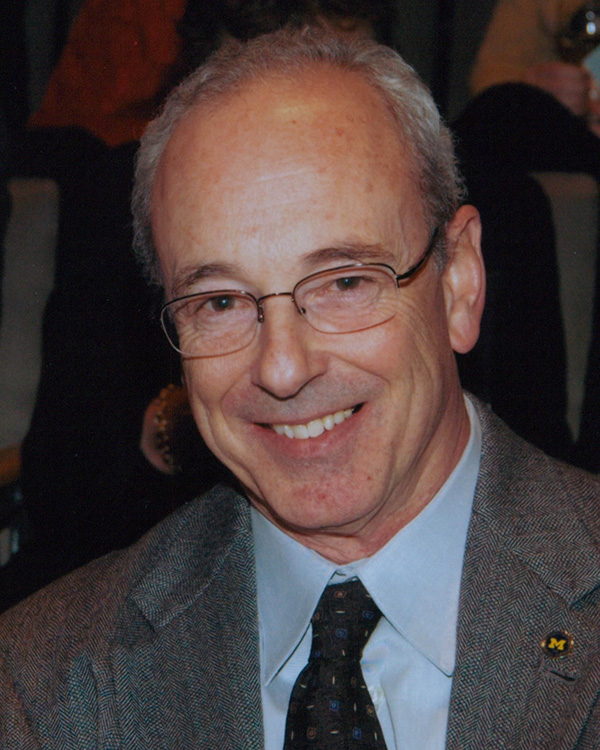In memoriam: William L. Smith
William L. Smith, former associate editor of the Journal of Biological Chemistry and co-editor-in-chief and associate editor of the Journal of Lipid Research, died October 12. He was 79 and had been a member of the American Society for Biochemistry and Molecular Biology for more than 40 years.

Smith was born Oct. 28, 1945, in Tulsa, Oklahoma, to a homemaker mother and a Navy Silver Star submarine commander father. He attended elementary, junior high and his first years of high school in Chicago and his last two years of high school in Fort Collins, Colorado.
After earning his bachelor’s degree from the University of Colorado in 1967 and his Ph.D. from the University of Michigan in 1971, Smith began his academic career at Michigan State University in 1975. Almost three decades later, he moved to the University of Michigan faculty as a professor and chair of the biological chemistry department. In 2015, he retired and was named professor emeritus.
In his lab, Smith studied signal transduction, eicosanoids, lipid mediators and essential fatty acids. He helped identify the enzyme COX-2 and investigated how COX enzymes convert arachidonic acid into prostaglandins, regulate blood flow and drive blood clot formation. His work laid the foundation for the development of nonsteroidal anti-inflammatory drugs, such as celecoxib. In 2019, he wrote a reflection in JBC titled “A seven-step plan for becoming a moderately rich and famous biochemist.”
Alex Toker, professor of pathology at Harvard Medical School, ASBMB fellow and JBC editor-in-chief, met Smith in the early 2000s, soon after Smith began his tenure as JBC associate editor.
“As a JBC Editorial Board member, I was fortunate enough to overlap with Bill Smith, and I recall his brilliant mind and magnificent sense of humor,” Toker said. “He was an exceptional scientist, having made numerous fundamental contributions to the field of lipid mediators, eicosanoids and cell signaling. He was an even more exceptional human being with a sharp wit that made you cling to every word he said. He will be enormously missed by everyone in our community.”
Smith was a dedicated mentor. He taught undergraduate biochemistry courses, served on several thesis committees and advised many graduate students and postdoctoral fellows. For both his research and his commitment to the training of younger scientists, he received the ASBMB William C. Rose Award in 2006.
According to the ASBMB Today article about the award, during Smith’s last eight years at Michigan State, “He took the lead on persuading the biological science departments to do joint recruiting of students, in a unique but effective umbrella program which preserved the independence of departments and their curriculum. He was also a leader in convincing the administration that support of cutting-edge research facilities is crucial to the growth and success of the biomedical research enterprise.”
Smith’s many other honors included the 2004 ASBMB Avanti Award in Lipids, the Bayer Corporation's Senior Aspirin Award and the State of Michigan Scientist of the Year Award. He served as an ASBMB Council member from 2003 to 2005, and in 2023, he was named an ASBMB fellow in recognition of his long service to the society and its journals as well as his stature as a scientist.
George Carman, a professor of food science at Rutgers University, associate editor of JBC and JLR, and himself an ASBMB fellow, nominated Smith as a fellow, writing, “Bill’s scientific stature is exemplified by continuous funding from the NIH, service on national and international advisory boards, service on numerous editorial boards besides those operated by ASBMB, and numerous honors and awards.”
Contacted this week, Carman said, “Bill Smith was a mentor, editorial colleague and a close friend. I am deeply saddened by his passing.”
Smith is survived by his wife, Andrea; children, Shannon, Tyler and Zachary; and nine grandchildren.
Enjoy reading ASBMB Today?
Become a member to receive the print edition four times a year and the digital edition monthly.
Learn moreGet the latest from ASBMB Today
Enter your email address, and we’ll send you a weekly email with recent articles, interviews and more.
Latest in People
People highlights or most popular articles

Building a career in nutrition across continents
Driven by past women in science, Kazi Sarjana Safain left Bangladesh and pursued a scientific career in the U.S.

Kiessling wins glycobiology award
She was honored by the Society for Glycobiology for her work on protein–glycan interactions.

2026 ASBMB election results
Meet the new Council members and Nominating Committee member.

Simcox wins SACNAS mentorship award
She was recognized for her sustained excellence in mentorship and was honored at SACNAS’ 2025 National Conference.

From humble beginnings to unlocking lysosomal secrets
Monther Abu–Remaileh will receive the ASBMB’s 2026 Walter A. Shaw Young Investigator Award in Lipid Research at the ASBMB Annual Meeting, March 7-10 in Washington, D.C.

Chemistry meets biology to thwart parasites
Margaret Phillips will receive the Alice and C. C. Wang Award in Molecular Parasitology at the ASBMB Annual Meeting, March 7-10 in Washington, D.C.

